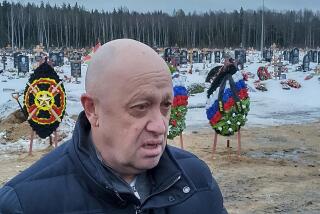Moscow Party Chief Reportedly Offered to Quit : Ally Denies He Assailed Gorbachev
MOSCOW — A sharp dispute involving one of Soviet leader Mikhail S. Gorbachev’s leading disciples broke out last week at a Communist Party Central Committee meeting, Soviet sources said Friday. But they denied that it had anything to do with last week’s delay in setting a date for a superpower summit.
The clash erupted when Boris N. Yeltsin, chief of the Moscow party, reportedly claimed that some members of the Politburo had slowed the pace of the perestroika , or restructuring, advocated by Gorbachev. Yeltsin, a junior member of the ruling body who is known for being more outspoken than his top-ranking colleagues, dramatized his criticism by offering to resign, according to widespread but unconfirmed reports.
On Friday, the only official word was that Yeltsin, 56, was still at work running the city government, but Communist Party spokesmen were extremely reluctant to discuss the issue.
Conflicting Accounts
Western diplomats said they heard conflicting versions about what occurred at the plenum, held Oct. 21, primarily to discuss the speech that Gorbachev will deliver to celebrate the 70th anniversary of the Bolshevik Revolution on Nov. 7.
The New York Times reported Friday that Yeltsin, regarded as an all-out supporter of Gorbachev’s reform policies, turned on his leader and accused him of cultivating a cult of personality--an extremely serious charge in Soviet political parlance and one used to describe Josef Stalin’s transgressions. It implies that a Soviet leader is ignoring the internal consensus of the political elite on important policy issues and substituting his individual will for that of the party.
That attack, according to the New York Times account, ignited a political crisis that may have caused Gorbachev to delay agreeing to a summit date last week, when he held talks with Secretary of State George P. Shultz.
But Yeltsin, reached by telephone in his office, told CBS anchorman Dan Rather that he had made no such attack.
“No, no! I categorically deny it. I never said it. A categorical no!” Yeltsin said when Rather asked him whether he had attacked Gorbachev on the personality cult issue.
Yeltsin, granting Rather a three-minute interview, refused to say what he had said at the Moscow meeting.
Several Western observers said it was difficult to believe that Yeltsin, of all people, would make such a statement.
In another version of the events at the meeting, Yeltsin was said to have aimed his criticism at some Soviet newspapers and magazines--and not at Gorbachev personally--for overpraising perestroika and virtually idolizing the Kremlin leader.
Still another version--and the one that appears to have the most credibility with Western observers--is that Yeltsin criticized Yegor K. Ligachev, generally regarded as the second-ranking member of the Politburo, either directly or by implication for blocking the progress of perestroika.
Ligachev, according to this version, counterattacked by saying that Yeltsin had accomplished very little in improving Moscow services since taking office two years ago.
In Washington, a senior Administration specialist in Soviet affairs said the reports that Yeltsin directed his criticism exclusively at Ligachev are more plausible than the account that Yeltsin attacked Gorbachev.
Yeltsin, he noted, is considered a strong proponent of Gorbachev’s program to revitalize the Soviet economy, while Ligachev has frequently struck a more conservative tone on economic reform and the partial relaxation of censorship.
Upset by Pace of Reforms
Other U.S. analysts have said that Ligachev appears to share Gorbachev’s belief that economic reform is needed to enable the Soviet Union to compete with the West and preserve its military power. At the same time, however, Ligachev appears uneasy about the rapid pace and direction of reforms toward a more market-oriented economy, and he has positioned himself to succeed Gorbachev if the Soviet leader stumbles.
The Administration official said it is clear that Soviet officials who are leaking the version about Yeltsin attacking Gorbachev are doing so for internal political reasons. “Whoever leaked this put a certain spin on it, presumably to discredit Gorbachev.”
The official said that some incident involving Yeltsin may partly account for the sudden and unexpected hardening of Gorbachev’s attitude toward a summit last week, but probably only in the sense that the internal dispute was a “distraction, and he (Gorbachev) had trouble coping with these two things at once.”
The official said it appears now that Gorbachev “mishandled” part of his talk with Shultz, overstating his concern that a summit produce an American commitment on strategic arms reduction and limits for space weapons and “backing himself into a corner.”
“On reflection, he seems to have realized this,” the official said, referring to Friday’s announcement of a summit date of Dec. 7.
Lack of Consensus
Some Western analysts have suggested that the policy flip-flops were due to a lack of consensus in the top Soviet leadership about the terms under which Gorbachev would come to the United States. Under this theory, the unanimously negative reaction in the West to last week’s apparent hardening of conditions for a summit--the accusations of bad faith--convinced the leadership to allow Gorbachev to put the process back on track.
Soviet Foreign Minister Eduard A. Shevardnadze, in Washington to meet President Reagan and finalize the summit arrangements, commented that “never before has there been such a degree of unity and cohesion in the Soviet Union.” Reports of an internal Kremlin political crisis were “wrong information,” he said at a press conference at the Soviet Embassy.
Yeltsin is a populist-minded leader who rode Moscow buses and subways himself to learn about the transportation system. He has kept a high profile since he succeeded Viktor K. Grishin as the party boss in the capital.
Recently, he discussed plans for Moscow’s future for three hours with foreign ambassadors and heads of mission in an unprecedented question-and-answer session. It is rare, even for diplomats, to have an opportunity for such a lengthy meeting with a member of the Politburo.
Apparently acting with Gorbachev’s approval, he disclosed some of the details of the Chernobyl nuclear power plant disaster while visiting West Germany.
Times staff writer Robert Gillette, in Washington, contributed to this article.
More to Read
Sign up for Essential California
The most important California stories and recommendations in your inbox every morning.
You may occasionally receive promotional content from the Los Angeles Times.










